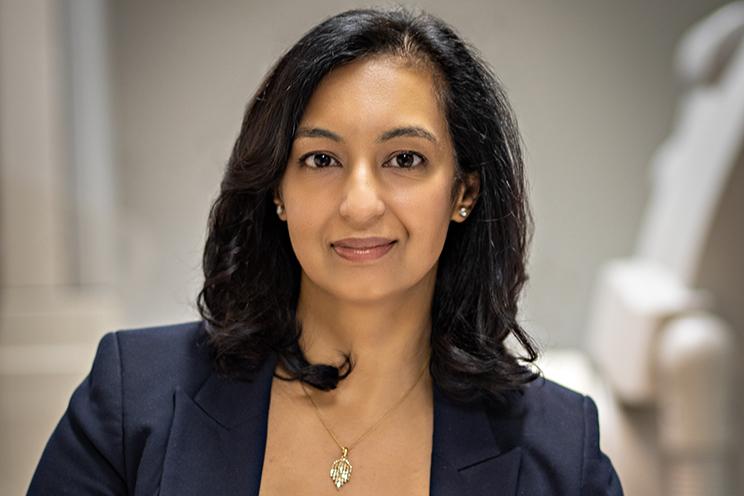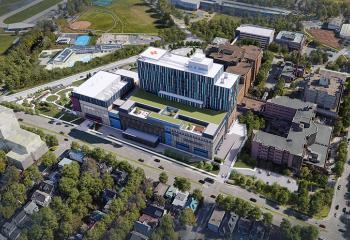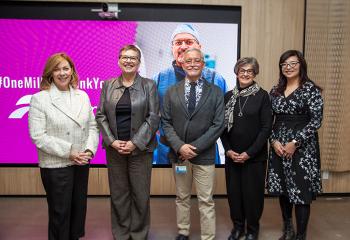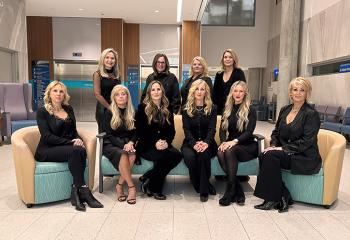
Dr. Ratika Parkash, QEII cardiologist, was recently named the Heart and Stroke Foundation of Nova Scotia Endowed Chair in Cardiovascular Outcomes Research, a five-year position supported by the QEII Foundation. Dr. Parkash is bringing her expertise to the position, with a focus on improving how patients across the province experience heart care. CONTRIBUTED
Dr. Ratika Parkash is on a mission to improve cardiac care, expand research
To say Dr. Ratika Parkash was passionate as a medical student would be an understatement.
“I was fascinated by the cardiovascular system, particularly electrocardiograms,” says Dr. Parkash.
“What attracted me to cardiology was the combination of anatomy, physiology, and electrical parts of the system. It’s an unbelievable feat of engineering and physiology.”
That early spark turned into a lifelong passion for understanding the heart, and now, more than 20 years later, she’s leading a new chapter in heart health for Nova Scotians.
A New (Heart) Beat
In December 2024, Dr. Parkash was named the next Heart and Stroke Foundation of Nova Scotia Endowed Chair in Cardiovascular Outcomes Research, a five-year position supported by the QEII Foundation. She’s bringing her expertise to improve how patients across the province experience heart care.
“I enjoy helping patients tremendously,” says Dr. Parkash, who works at the QEII Health Sciences Centre and teaches at Dalhousie University. “But one thing you can do with research is help many patients all at once if you’re able to create new knowledge and make patients’ lives better.”
Dr. Parkash also has plenty of experience in research and knowledge-seeking.
Her research has focused on atrial fibrillation (AF), a common heart rhythm disorder, and cardiac implantable electronic devices (CIEDs), like pacemakers and defibrillators.
She’s worked on national studies, including one (RAFT-AF trial) that looked at whether a procedure called catheter ablation — which uses heat or cold through a thin tube to correct irregular heart rhythms — could help patients with both AF and heart failure live longer and feel better. Additionally, she’s led studies like the SMAC-AF trial that examined whether aggressive blood pressure reduction could decrease the recurrence of AF after catheter ablation. Furthermore, she’s been involved in studies that have shown removing CIEDs isn’t always the best option for patients and can lead to higher complications.
With various roles, including associate scientific director of the Cardiac Arrhythmia Network of Canada (CANet) and deputy editor of Journal of the American College of Cardiology: Clinical Electrophysiology on her resumé, Dr. Parkash is a trusted voice in the world of cardiology.
These Are Lofty Goals
Dr. Parkash is now setting her sights even higher for the next five years.
One of her main goals is to ensure research and care reach every corner of Nova Scotia; not just those who live near major hospitals in Halifax and Cape Breton.
Connecting researchers is also paramount for Dr. Parkash.
“I'd like to be able to bring researchers in Nova Scotia together to work on cardiovascular outcomes so that we aren't working in silos,” says Dr. Parkash, who also hopes to connect with experts in geriatrics, neurology and cardiovascular health.
Already in Action
Dr. Parkash is part of a study called VIRTUES-CIED, which just finished enrolling more than 2,000 patients across Canada — including several hundred in Nova Scotia. It examines whether a digital care platform can help manage patients with CIEDs more efficiently, especially in rural areas.
And that’s just the beginning.
“Anything you can think of that affects the cardiovascular system; we are in the process of developing a virtual care strategy that basically allows all patients in Nova Scotia to receive care as if they were being managed by a specialist,” she adds.
Carrying on the Legacy
Dr. Parkash’s appointment follows the work of Dr. Jafna Cox, who held the endowed chair until 2021. Dr. Cox’s work included research on heart disease prevention and the effects of COVID-19 on cardiovascular health.
This chair position is made possible by the QEII Foundation’s endowed research program, which supports seven research chairs in various care disciplines. The chairs are funded through permanently invested donations, with only the interest used to fund research, ensuring these roles last for generations.
And the investment is paying off.
“Without the support of the QEII Foundation, much of the work that I’d like to be able to do in the second half of my career would not be possible,” says Dr. Parkash. “It allows many of the research programs to go without interruption and without delay. The benefit to Nova Scotians is going to be significant.”


